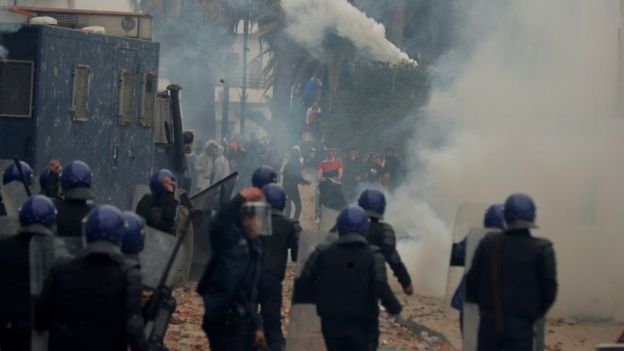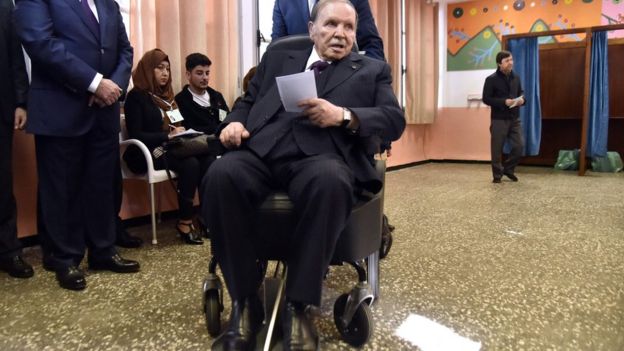Algerians protesting against the rule of President Abdelaziz Bouteflika have staged huge demonstrations in the capital, Algiers, and other cities.
Riot police fired tear gas to prevent protesters reaching a road leading to the presidential palace, but the rallies were mostly peaceful.
Local reports said nearly 200 people were detained by the security forces.
A wave of unrest began last month after Mr Bouteflika announced he would seek a fifth term in office in April.
The president, who is currently in hospital in Switzerland, has ruled Algeria for 20 years but has rarely been seen in public since he had a stroke in 2013.
He has warned that the protests could plunge the country into "chaos".
In a letter published by Algeria's official APS news agency on Thursday, the 82-year-old leader urged "vigilance" against "domestic and foreign" forces that might infiltrate the demonstrations.
But he also praised the demonstrators for "peacefully expressing their opinions".
 |
| Despite calls for calm, there were clashes between stone-throwing protesters and riot police, who fired tear gas |
What happened on Friday?
The protest was the largest one ever against President Bouteflika. Riot police were deployed along the protest route, and helicopters circled the capital. All public transport services in the capital were suspended ahead of the rally.
Demonstrations were also reported in Algeria's second-largest city, Oran, and in Tizi Ouzou. Some organisers had called for 20 million people to take part in Friday's demonstrations, billed as the "#March 8 Movement" on social media.
Several lawmakers from the governing FLN party have expressed support for the protesters, Reuters news agency reports.
Opposition politicians have also been meeting to discuss the protests, according to BBC North Africa correspondent Rana Jawad. However, she says, the opposition has long been weakened by the FLN and is viewed with a certain suspicion by the public.
 |
| Mr Bouteflika is rarely seem in public nowadays |
What do the protesters want?
The wave of protests was triggered by the announcement last month that Mr Bouteflika would seek a fifth term in office.
Mr Bouteflika later released a statement saying that he would step down early if re-elected - but this has not placated the demonstrators.
Many young Algerians are frustrated by a lack of economic opportunity and by what they perceive as the corruption of an elite that has governed the country since it gained independence from France.
Banners at Friday's protest carried slogans saying: "Algeria is a republic, not a kingdom", and "No elections till the gangs are brought down", Reuters reports.
What do these protests mean?
Rana Jawad, North Africa correspondent
Any demonstrations on Fridays - a day of faith and rest in this part of the world - tend to be larger, and carry a higher risk of civil unrest. True to form, the latest protests in Algeria were the largest yet.
These demonstrations show no signs of easing, instead growing in size and in the scope of their demands. Their significance was heightened when one of Algeria's top clerics broke with tradition by omitting any mention of the ailing president in Friday's prayers.
Though the army appears to still be staunchly behind the president, some of the ruling FLN is beginning respond to a changing climate. A few lawmakers from the party are reported to have resigned, and the voices among the opposition are getting louder. Algerians are waiting to see if these developments are a sign of genuine change or mere opportunism.
Regardless, the days of romanticising popular movements in this region are long gone. This is not 2011 and the "Arab Spring" all over again. Libya and Syria continue to serve as a lesson to Western powers of all that can go wrong - in particular European nations, which are likely to be looking on nervously.
There is no obvious successor to President Bouteflika who will be acceptable to the people, and the governing elite is too entrenched to immediately disentangle itself from the system. For now, Algerians are marching on, seemingly determined to re-draw the politics of the country, for a future of their own design.
Where is the president?
The president is believed to have been transferred to a hospital in Switzerland on 24 February, for what his campaign described as "routine" medical tests.
His campaign manager told El Khabar on Thursday that his health raised "no concerns".
A spokesman for the Geneva University Hospitals refused to comment when asked if Mr Bouteflika was there. However, he has been quoted as saying that it had received 1,500 phone calls on Tuesday after the president's location was revealed by French television programme Quotidien.
While most of the calls have reportedly been enquiring about the president's health, a number of videos posted to social media show prank calls from Algerians.
Source: BBCNews


No comments:
Post a Comment
Add a Comment...